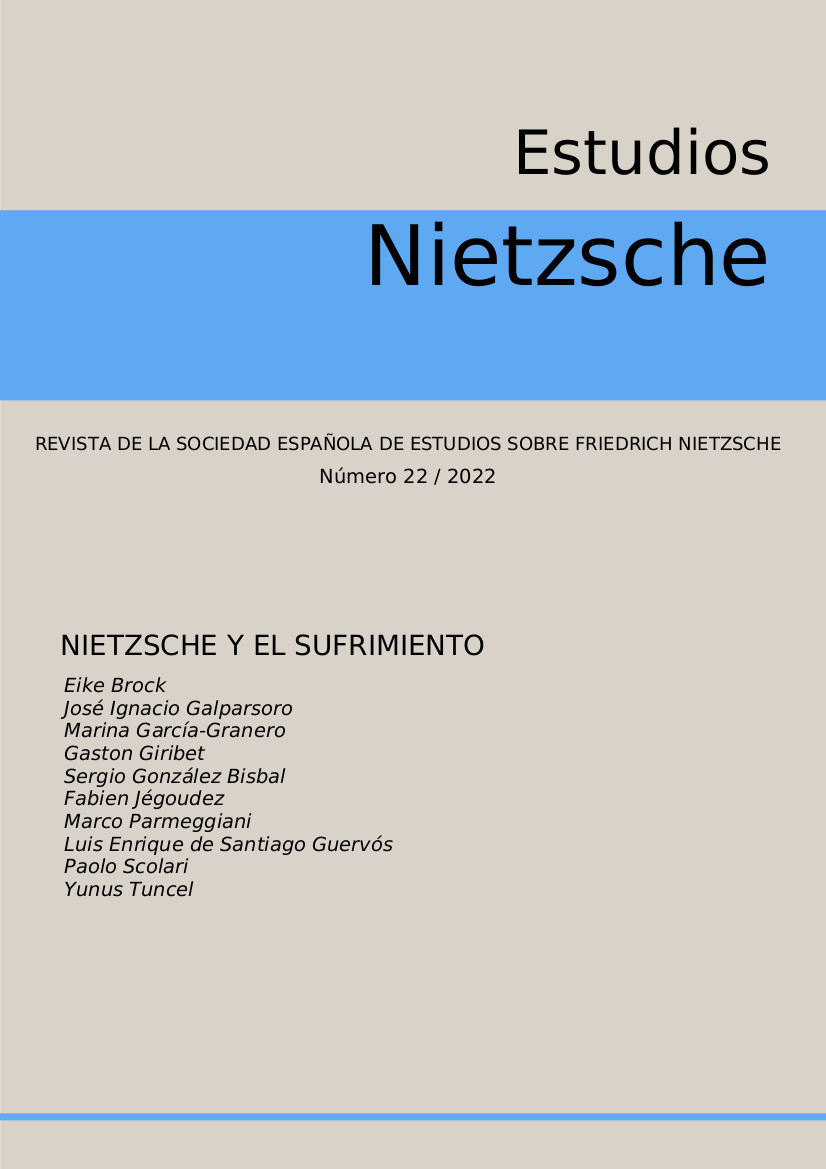The critique of intellectual education common to Leopardi and Nietzsche
DOI:
https://doi.org/10.24310/EstudiosNIETen.vi22.13755Keywords:
education, mind, spirit, Leopardi, bodyAbstract
This article formulates the hypothesis of a remarkable convergence between the thinking of Giacomo Leopardi and Friedrich Nietzsche, who both criticize modern education the same way, putting too much emphasis on intellectual development. The two thinkers also draw on common sources concerning the educational know-how: the classical era in Europe and the antiquity. Against the excess of modern unilateral intellectual education and in the path of Leopardi, Nietzsche seems to search for a new norm, an education up to human beings that would respect their nature, capacities, and potentials at the same time.
Downloads
Metrics
References
Burckhardt, Jacob, Considérations sur l’histoire universelle, trad. S. Stelling-Michaud, Paris : Allia 2001.
Campioni, Giuliano [et al.] (éds.), Nietzsches persönliche Bibliothek, Berlin/New York : De Gruyter 2003.
Hölderlin, Friedrich, Hypérion, trad. P. Jaccottet, en Œuvres, Paris : Gallimard 1967.
Hoyer, Timo, Nietzsche und die Pa?dagogik : Werk, Biografie und Rezeption, Wu?rzburg : Ko?nigshausen & Neumann 2002.
Iengo, Francesco, Momenti di critica alla modernità da Leopardi a Nietzsche, Roma : Bulzoni 1992.
Jégoudez, Fabien, « Nietzsches „voller Mensch“ als Bildungsziel. Versuch einer Reform der Philologie gegen die
Gelehrsamkeit » : Nietzscheforschung 27 (2020), 213-223.
Leopardi, Giacomo, Dialogue de Tristan et d’un ami, trad. J. Bertrand, en Canti, Paris : Gallimard 1996.
Leopardi, Giacomo, Zibaldone, trad. B. Schefer, Paris : Allia 2003.
Marrou, Henri-Irénée, Histoire de l’éducation dans l’Antiquité, tome I, Paris : Seuil 1981.
Nietzsche, Friedrich, Œuvres philosophiques complètes, trad. C. Heim, J.-C. Hémery, J. Hervier, P. Klossowski, Paris : Gallimard 1968-1997.
Nietzsche, Friedrich, Sämtliche Werke. Kritische Studienausgabe in 15 Bänden, Giorgio Colli et Mazzino Montinari (éds.), München : Deutscher Taschenbuch Verlag, Berlin/New York : De Gruyter 1988.
Van Tongeren, Paul, « Measure and Bildung » en Thomas Hart (éd.), Nietzsche, Culture, and Education, Abingdon/New York : Ashgate Publishing 2009, 97-111.
Downloads
Published
How to Cite
Issue
Section
License
As of issue 21 (2021) this journal is published only in open access (diamond route).
From that number 21, like the previous numbers published in NIETZSCHE STUDIES, they are subject to the Creative Commons Acknowledgment-NoComercia-ShareIgual 4.0 license, the full text of which can be consulted at <http://creativecommons.org/licenses/by-nc-sa/4.0 >
It is the responsibility of the authors to obtain the necessary permissions of the images that are subject to copyright.
This work is licensed under a Creative Commons Attribution-NonCommercial-ShareAlike 4.0 International License.
Copyright generates two different rights: moral rights and patrimonial rights that EJFB recognizes and respects. Moral rights are those relating to the recognition of the authorship. They are rights of a personal nature that are perpetual, inalienable, unseizable and imprescriptible as consequence of the indivisible union of the author and his/her work.
Patrimonial rights are those that can be derived from the reproduction, distribution, adaptation or communication of the work, among others.







11.png)
